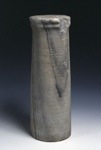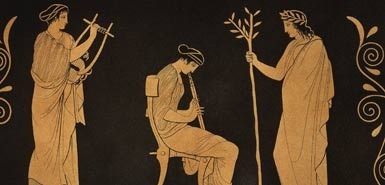It is easy to forget that the great epics of classical Greek poetry were originally sung. Since the 16th century, scholars have been trying to reconstruct the songs of Sappho, Sophocles, Euripides and Homer from their signature poems.
Now research carried out by Armand d’Angour at Oxford University is bringing us several steps closer to hearing how this ancient music sounded.
The reconstruction is based on rhythm inherent in the words themselves, knowledge of instruments used (from descriptions and pictures) and now, new revelations about ancient Greek music have emerged from a few dozen ancient documents inscribed with a vocal notation devised around 450 BC, consisting of alphabetic letters and signs placed above the vowels of the Greek words.
The instrumentation was probably quite sparse, with the 4 stringed lyre , called a phorminx, reed pipes and percussion being dominant. The tuning was in microtones. Euripides turns out notoriously avant garde, whereas Homer’s epics are rather more monotone.
 Here are reconstructions of a stone inscription by the poet Seikilos on a marble column from around 200BC. The lyrics are:
Here are reconstructions of a stone inscription by the poet Seikilos on a marble column from around 200BC. The lyrics are:
While you’re alive, be a star in the sky.
Always keep your spirits high.
Life is short, the end is nigh.
Shine on now, we soon shall die
David Creese, a Lecturer in Classics at Newcastle University, constructed a zither-like instrument called a “canon,” with eight strings and movable bridges, which he has used to play the song on the Seikilos epitaph, utilizing the scale-ratios provided by the mathematician Ptolemy in the second century AD. Below is one of Creese’s versions of the song
Michael Levy, an ancient music researcher who frequently performs on his own version of an ancient lyre, has performed his own version of the song, as a lyre solo

